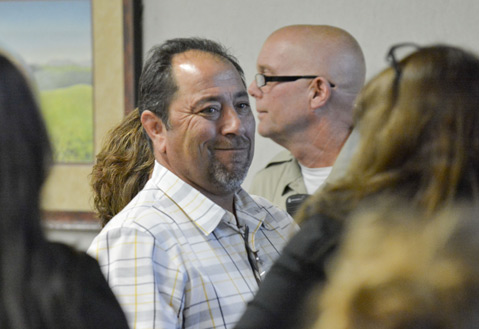County Making Nice with Chumash?
Supervisors Agree to Open Talks About Land Use and Finances

When the matter of county relations with the Chumash went before the supervisors this week, the supervisors already appeared stressed over missing binders from the previous hearing. After a tense meeting, the jaw-clenching subsided some when the supervisors unanimously moved to appoint supervisors Doreen Farr and Peter Adam to formally talk to tribal leaders about properties of interest and waiving their sovereign immunity.
On Tuesday, the angst peaked when the supervisors relived a June hearing of the Subcommittee on Indian, Insular and Alaska Native Affairs in Washington, D.C., on a federal bill that would expedite Chumash annexation of Camp 4, the 1,400-acre ranch land in Santa Ynez Valley the tribe purchased in 2010.
At that hearing, subcommittee members essentially scolded the county’s CEO, Mona Miyasato, who represented the board, and ordered the county to go to the table with the tribe to talk as they would with another government entity like a city. “They are a sovereign nation. And for any institution in the United States not to recognize that is backward,” California Representative Raul Ruiz (D-Palm Desert) said in June.
If the county failed to do so, subcommittee Chair Don Young (AK- At-Large) threatened to move the bill, HR 1157, forward. (Many believe the bill — if passed in the House of Representatives — would not succeed in the Senate.)
On Tuesday, Supervisor Janet Wolf expressed disappointment with the condescending remarks made by subcommittee members to the county’s “female CEO.” “We threw her into the lions’ den,” Wolf said. In her testimony, Miyasato told the subcommittee the federal bill to place Camp 4 into federal trust would circumvent the application process set up by the Bureau of Indian Affairs (BIA). Late last year, the BIA granted the tribe’s application to place Camp 4 into trust. Early this year, the county, among other groups, appealed on grounds of environmental impact and lost property-tax revenues. Many note the BIA is inclined to grant such applications.
Wolf went on to call out 5th District Supervisor Steve Lavagnino — who, along with Supervisor Salud Carbajal, has been on the opposing side of the issue — for also making the trip to D.C. to argue the county has failed to enter government-to-government dialogue with the tribe. Lavagnino told Congress that the “… Board of Supervisors has failed to perform its responsibilities as the local jurisdiction” and that his advice to his colleagues to negotiate with the tribe “fell on deaf ears.” Wolf said Tuesday of his testimony: “It was an embarrassment to me.”
Swinging back, Lavagnino asked why Wolf did not privately share this with him in the last two months. “What’s been embarrassing is the way the county ignored the tribe,” he said, noting congressmembers shared his feeling. “This was exactly my thoughts,” he said of his written testimony. “I will live with the consequences.”
Several valley residents speaking during public comment shared Wolf’s sentiment. Attorney James Marino, who represents POLO (Preservation of Los Olivos), was taken aback by the fact the county spent more than $1,300 on Lavagnino’s plane ticket. Others noted the modern economic success of the tribe. “I’m wondering why my husband and I should subsidize the one-percenters,” said one valley resident, referring to the fact that the tribe is exempt from county property taxes once the property is annexed into the reservation. Chair Vincent Armenta said after the hearing that the tribe offered the county $1 million a year plus an enforceable waiver of sovereign immunity four years ago. “Now it’s 2015, and the county is asking the tribe for the same sovereign immunity waiver,” he said. “It’s ironic.” Armenta went on to say what should be government-to-government dialogue is actually “government-to-public-to-government” discussion. Previous discussion occurred behind closed doors.
On the flipside, Supervisor Doreen Farr, who represents the valley, said the county has a “long history” with the tribe predating her tenure. “I’ve never refused to talk to the tribe and continue to recognize them as a sovereign nation,” she said. She said several years ago, a representative from the tribe walked away from engagement with the county.
In 2013, the supervisors voted 3-2 — with Lavagnino and Carbajal dissenting — to request the tribe begin discussions with the Planning and Development Department over their plans to develop Camp 4. At the time, the majority of the board was concerned that entering government-to-government talks would impact the trust application.
Since then, tribal leaders have also informed the county of their intention to bring a two-acre property known as Mooney and Escobar into trust.



